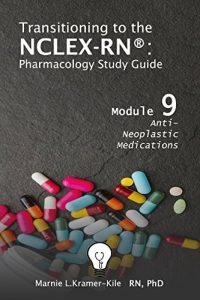The purpose of this pharmacology study guide is to help nursing graduates work through the vast amount of pharmacological knowledge required for the NCLEX-RN® in a systematic and purposeful way. The breadth and detail of the knowledge required of pharmacological concepts often overwhelms new graduates when they are beginning their exam preparation. This guide organizes content using the current NCLEX-RN® Test Plan and provides specific strategies to address pharmacological areas of review which may challenge new graduates in their exam preparation. The guide was created by an experienced undergraduate nurse educator specializing in critical thinking development and application for high stakes exam writing. Many candidates, while studying for the NCLEX-RN®, often forgo studying pharmacological concepts in the detail required for the exam.
The purpose of the modules in this Pharmacology study guide series are to:
•Provide in-depth review of the major drug classes from a systems approach (e.g. respiratory, nervous system etc…) to help increase retention of key concepts and encourage application of pharmacological therapy in the context of disease management.
•Summarize important information related to drug therapy and guide graduates to in-depth review of serious adverse events associated with medications. The modules will contain summary tables, review questions and exercises for key concepts.
•Direct the reader to important areas for client assessment during drug therapy
This is a working pharmacology study guide, so while key information will be presented and organized for review, it is up to you to do the detailed work of content review by answering the questions and exercises in each module
The following resources are recommended to use with this pharmacology study guide:
1.Pharmacology textbook. This resource will contain the detailed information pertaining to drug classes and specific nursing considerations related to drug therapy.
2.Drug guide. These resources contain alphabetized drug information and outline pharmacokinetic and pharmacodynamics characteristics of medications. You will find important information related to the absorption, distribution, metabolism and excretions of drugs- as well as protein binding and therapeutic index.
3.An online drug repository if the resources above do not contain the information needed to answer the questions in the guide.
This is the 9th of twelve modules and is part of a comprehensive pharmacology study guide focusing on specific areas which may challenge NCLEX-RN® candidates. This includes drug-to-drug interactions, specific adverse reactions due to drug therapy and the potential reactions associated with herbal therapy and conventional medications. The content will be focused on a systems approach and will direct you towards important information within each drug class.
Each module contains practice questions using NCLEX-RN® formatted questions. It is recommended that you seek additional practice questions from resources that challenge you to go into pharmacological concepts such as serious adverse events and drug-to-drug interactions in detail and test your knowledge specific nursing interventions related to drug therapy.
This ninth module focuses on antineoplastic drugs for cancer therapy. The module begins by differentiating cell cycle and non-cell cycle specific therapy and outlining the common pathway for the treatment of cancer. Toxicity in the context of antineoplastic medications is discussed. Common side effects of antineoplastic medications are identified with appropriate nursing interventions included and a comprehensive list of cell cycle specific, non-cell cycle specific and hormone therapy for cancer is provided. Each drug class identified has review questions and tips for studying.
The purpose of the modules in this Pharmacology study guide series are to:
•Provide in-depth review of the major drug classes from a systems approach (e.g. respiratory, nervous system etc…) to help increase retention of key concepts and encourage application of pharmacological therapy in the context of disease management.
•Summarize important information related to drug therapy and guide graduates to in-depth review of serious adverse events associated with medications. The modules will contain summary tables, review questions and exercises for key concepts.
•Direct the reader to important areas for client assessment during drug therapy
This is a working pharmacology study guide, so while key information will be presented and organized for review, it is up to you to do the detailed work of content review by answering the questions and exercises in each module
The following resources are recommended to use with this pharmacology study guide:
1.Pharmacology textbook. This resource will contain the detailed information pertaining to drug classes and specific nursing considerations related to drug therapy.
2.Drug guide. These resources contain alphabetized drug information and outline pharmacokinetic and pharmacodynamics characteristics of medications. You will find important information related to the absorption, distribution, metabolism and excretions of drugs- as well as protein binding and therapeutic index.
3.An online drug repository if the resources above do not contain the information needed to answer the questions in the guide.
This is the 9th of twelve modules and is part of a comprehensive pharmacology study guide focusing on specific areas which may challenge NCLEX-RN® candidates. This includes drug-to-drug interactions, specific adverse reactions due to drug therapy and the potential reactions associated with herbal therapy and conventional medications. The content will be focused on a systems approach and will direct you towards important information within each drug class.
Each module contains practice questions using NCLEX-RN® formatted questions. It is recommended that you seek additional practice questions from resources that challenge you to go into pharmacological concepts such as serious adverse events and drug-to-drug interactions in detail and test your knowledge specific nursing interventions related to drug therapy.
This ninth module focuses on antineoplastic drugs for cancer therapy. The module begins by differentiating cell cycle and non-cell cycle specific therapy and outlining the common pathway for the treatment of cancer. Toxicity in the context of antineoplastic medications is discussed. Common side effects of antineoplastic medications are identified with appropriate nursing interventions included and a comprehensive list of cell cycle specific, non-cell cycle specific and hormone therapy for cancer is provided. Each drug class identified has review questions and tips for studying.






